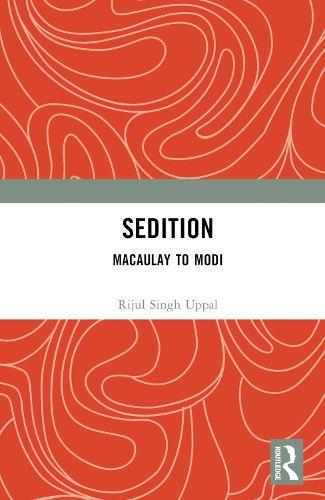Readings Newsletter
Become a Readings Member to make your shopping experience even easier.
Sign in or sign up for free!
You’re not far away from qualifying for FREE standard shipping within Australia
You’ve qualified for FREE standard shipping within Australia
The cart is loading…






The liberal use of the sedition law in recent years, mainly by state governments intolerant of dissenting opinion, has provoked justified controversy. After some prominent individuals fell afoul of the law, activists, journalists, lawyers, and jurists took up cudgels on behalf of the victims, and demanded that the law be scrapped, as it belongs to the colonial era. The Supreme Court of India, in May 2022, admitted a host of petitions challenging the law as upheld in Kedar Nath Singh vs Union of India, 1961.
The author believes that the fundamental right to free speech is a non-negotiable right in a democratic country, but the law is relevant for countering threats to national security and sovereignty. Examining the trajectory of the sedition law from its introduction by the British colonial power and its subsequent rejection by the Constituent Assembly of India, the author observes that the statute had to be hastily restored by the Provisional Parliament to cope with the challenges posed by communal rioting in many parts of the country, several years after independence. As such, it is pertinent in times of crisis. The current law undeniably needs safeguards against political misuse, but deserves a place on the statute.
Print edition not for sale in South Asia (India, Sri Lanka, Nepal, Bangladesh, Pakistan and Bhutan)
$9.00 standard shipping within Australia
FREE standard shipping within Australia for orders over $100.00
Express & International shipping calculated at checkout
The liberal use of the sedition law in recent years, mainly by state governments intolerant of dissenting opinion, has provoked justified controversy. After some prominent individuals fell afoul of the law, activists, journalists, lawyers, and jurists took up cudgels on behalf of the victims, and demanded that the law be scrapped, as it belongs to the colonial era. The Supreme Court of India, in May 2022, admitted a host of petitions challenging the law as upheld in Kedar Nath Singh vs Union of India, 1961.
The author believes that the fundamental right to free speech is a non-negotiable right in a democratic country, but the law is relevant for countering threats to national security and sovereignty. Examining the trajectory of the sedition law from its introduction by the British colonial power and its subsequent rejection by the Constituent Assembly of India, the author observes that the statute had to be hastily restored by the Provisional Parliament to cope with the challenges posed by communal rioting in many parts of the country, several years after independence. As such, it is pertinent in times of crisis. The current law undeniably needs safeguards against political misuse, but deserves a place on the statute.
Print edition not for sale in South Asia (India, Sri Lanka, Nepal, Bangladesh, Pakistan and Bhutan)